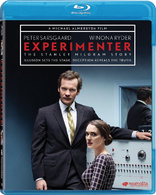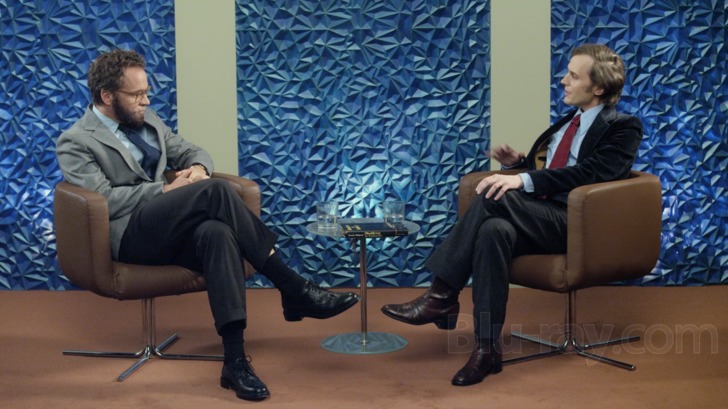Experimenter Blu-ray Movie
HomeExperimenter Blu-ray Movie 
Magnolia Pictures | 2015 | 98 min | Rated PG-13 | Jan 05, 2016
Movie rating
6.4 | / 10 |
Blu-ray rating
| Users | 0.0 | |
| Reviewer | 4.0 | |
| Overall | 4.0 |
Overview
Experimenter (2015)
In 1961, famed social psychologist Stanley Milgram begins a series of innovative behavior experiments designed to explore the psychology of obedience. The outcome is shocking, and Milgram becomes a controversial figure.
Starring: Peter Sarsgaard, Winona Ryder, Jim Gaffigan, Kellan Lutz, Taryn ManningDirector: Michael Almereyda
| Biography | Uncertain |
| Drama | Uncertain |
Specifications
Video
Video codec: MPEG-4 AVC
Video resolution: 1080p
Aspect ratio: 1.78:1
Original aspect ratio: 1.85:1
Audio
English: DTS-HD Master Audio 5.1 (48kHz, 16-bit)
Subtitles
English SDH, French, Spanish
Discs
25GB Blu-ray Disc
Single disc (1 BD)
BD-Live
Playback
Region A (C untested)
Review
Rating summary
| Movie | 4.0 | |
| Video | 4.0 | |
| Audio | 4.0 | |
| Extras | 2.0 | |
| Overall | 4.0 |
Experimenter Blu-ray Movie Review
"Please Continue, Teacher"
Reviewed by Michael Reuben January 10, 2016Experimenter explores the life and work of social psychologist Stanley Milgram, whose
"obedience experiment" stunned the world when its results were first reported in the press in
1963, not long after the execution of Adolf Eichmann, the architect of the Holocaust whose
defense was that he was just following orders. Milgram had originally expected his experiment to
demonstrate that a democratic society like America's inculcates moral "checks and balances" in
individuals, so that a similar submission to malevolent authority could never happen here. When
the results showed the opposite, Milgram became the center of a fiery controversy from which he
never managed to extricate himself—and which continues to this day. Both his findings and his
methods were attacked, and Milgram himself was accused of being an unethical monster who
deliberately tortured his own subjects.
The film's title also applies to its writer/director, Michael Almereyda, an experimental filmmaker
best known for his radical screen adaptations of Shakespeare (e.g., reimagining Hamlet, with
Ethan Hawke, as a battle for control of a modern corporation). In Experimenter, Almereyda
abandons realism and employs techniques borrowed from documentaries, tabloid re-creations,
old movies, even staged drama, to convey a sense of the world as Milgram saw it: a giant puzzle
of social relations to be investigated. Rear projection replaces realistic sets, sometimes in color
and sometimes in black-and-white. Milgram, as played by Peter Sarsgaard, repeatedly turns to the
camera to explain what is happening and why it is important. The "elephant in the room" that
Milgram's experiment became is represented by an actual elephant that follows Milgram down
the hall as he addresses the viewer.
Experimenter was inspired by Almereyda's reading of Milgram's Obedience to Authority,
published in 1974, and also by viewing films that Milgram made to show in his university
classes, including a documentary about the obedience experiment itself. Almereyda was struck by
Milgram's own skill as a filmmaker and by his urbane presence onscreen, which the director
compared to Rod Serling hosting The
Twilight Zone or Alfred Hitchcock on his TV shows. As
Almereyda has said: "[I]t's sort of odd to make a movie about an intellectual . . . . Milgram is
very much a guy whose life was spent reading, writing, and thinking, so his experiments become
the movie's essential action—a primary way Milgram interacts with other people, even as he
observes them from a distance." The style of Experimenter allows Milgram (as portrayed by
actor Peter Sarsgaard) to present his work on his own terms, even as Almereyda also gives voice
to his numerous critics.
Experimenter premiered at the Sundance Film Festival in January 2015. The film was later
acquired by Magnolia Pictures, which released it in October 2015 through VOD and in theaters.
Magnolia is now issuing it on Blu-ray in a first-rate presentation.

Experimenter's most realistic scenes are those re-creating the "obedience experiment", which were conducted from 1961-1962 when Milgram (Sarsgaard) was an assistant professor at Yale. The subject of the test, believing himself or herself to be participating in a cognitive study, is designated as a "teacher" and is instructed to deliver a series of increasingly powerful electric shocks to a "learner" strapped to a chair in the next room, whenever the learner answers a question incorrectly. In reality, the "learner" is part of Milgram's team and merely pretending to be shocked. If subjects hesitate to proceed to the next level of shock, a professional in a lab coat overseeing the test calmly advises them that the experiment requires them to continue.
According to every psychologist and psychiatrist Milgram consulted beforehand, the average subject would refuse to continue administering such painful "punishment" once the learner complained. Instead, the majority of Milgram's test subjects—an astonishing 65%—continued to apply electric shocks up to a potentially lethal voltage, even when the learner cried out in protest and begged for the test to end. After the test concluded and Milgram revealed the deception, such subjects typically felt no remorse or regret about their actions.
Throughout Experimenter, Milgram struggles to conceptualize the mechanism of obedience that he has uncovered, the moral and social determinants of the moment when the subject surrenders responsibility for his or her actions to someone else (in this case, the lab-coated professional played by John Palladino). He eventually coins the term "agentic state" for the condition in which someone lets themself become a mere conduit for a decision that has been made elsewhere.
Experimenter's re-creation is meticulously detailed, with subjects sitting before a bank of switches, frequently struggling with their consciences before proceeding to the next level of shock. Meanwhile, Milgram watches with an assistant (Harley Ware) from behind a one-way mirror, taking notes and emerging at the end to inform the subject that the electrical shocks weren't real and the "learner" is unharmed. (The learner is played by comic Jim Gaffigan with the amiable charm of someone for whom this is all in good fun.) Anthony Edwards appears as the first test subject, and many other faces follow as the experiment continues, including subjects played by John Leguizamo, Anton Yelchin and Taryn Manning. It's Manning's character, Mrs. Lowe, who later reproaches Milgram in a follow-up interview for lying to his subjects. He will hear the same criticism repeatedly throughout the film.
Milgram argues that test subjects always remain free to choose between obeying authority and listening to their conscience. Milgram's discovery, however—and also his concern—was that people's "true character" is much more liable to manipulation by an authority figure than anyone expected. Describe the experiment to a third party, and the immediate response is: "I wouldn't do that!" But as one of Milgram's test subjects later admits, no one can predict what they'll do when the moment of decision arrives.
When controversy over the obedience experiment destroys Milgram's prospects for tenure at Harvard, he accepts a position at the City University of New York, where the bustling urban streets inspire him to create new experiments. The "lost letter" measures how people react to strangers, depending on their affiliation. The "small world" exercise provides the basis for the now-famous of notion of "six degrees of separation". The "crowd pistol" technique reveals the power of suggestion in group behavior.
But whatever else he achieves, Milgram is always brought back to the obedience experiment and its controversial underpinnings. When he informs his class on November 22, 1963, that President Kennedy has been shot, they refuse to believe him, comparing his announcement to Orson Welles's War of the Worlds radio broadcast. The publication of his book in 1974 revives old criticisms, as shown in a TV interview with Dick Cavett (Tom Bateman). To his eventual regret, Milgram authorizes a melodramatic CBS Playhouse 90 dramatization of his work, entitled The Tenth Level, starring Ossie Davis (Dennis Haysbert) and a post-Star Trek William Shatner (Kellan Lutz).
Experimenter provides glimpses into Milgram's private life, with the primary focus on his supportive wife, Sasha (Winona Ryder), and a few scenes with their two children. (The real-life Sasha Milgram acted as a consultant to the film.) Although his personal life was relatively tame, Milgram's experiments changed the nature of social science as a discipline. Over 50 years later, his "obedience" results have yet to be explained away or conclusively disproved. But controversy took its toll. Milgram suffered multiple heart attacks and died at the age of 51.
Experimenter Blu-ray Movie, Video Quality 

Experimenter was shot by Ryan Samul (Cold
in July, Dark Was the Night
). Specifics about the
shooting format were unavailable, but the cameras seen in behind-the-scenes footage appear to be
digital. Post-production was completed on a digital intermediate from which Magnolia's 1080p,
AVC-encoded Blu-ray was presumably sourced by a direct digital path.
The Blu-ray image has a textured appearance that is almost film-like, which is probably a result
of post-processing to create a period look and to incorporate Experimenter's many photographic
effects. Despite occasional softness, the image is finely detailed, faithfully reproducing the period
clothing and decor, including the reproduction of Milgram's testing rooms and equipment. (By
contrast, the equipment used for the CBS Playhouse 90 production suggests low-budget sci-fi.)
The color palette is typically cool and detached ("serene" is the term used by the production
designer), which has the effect of intensifying the emotional pitch of scenes such as the
"obedience test" sequences. An exception is the Milgram home in the Bronx, where warm colors
predominate. Rear projections and other stylized photographic effects stand out immediately, but
this is clearly intentional. No visible distortion or interference has been added as part of the Blu-ray mastering.
Magnolia has mastered Experimenter with an average bitrate of just over 25 Mbps, which
appears to be sufficient for this unusual mixture of drama and documentary.
Experimenter Blu-ray Movie, Audio Quality 

Experimenter's 5.1 sound mix, encoded on Blu-ray in lossless DTS-HD MA, is an understated affair, as befits a story set in labs, offices and college classrooms. A subdued environmental ambiance can be heard in most scenes, but rarely does it intrude on the dialogue, which is always clear. Occasional sounds such as telephones, typewriters or the faked electric shocks stand out. The most memorable element of the soundtrack is the unsettling, jazz-inflected score by Brian Senti (Almereyda's Cymbeline), which adds a mournful, detached undertone to Milgram's inquiries.
Experimenter Blu-ray Movie, Special Features and Extras 

- The Making of Experimenter (1080p; 1.78:1; 5:51): This short EPK reviews the historical background of the film. Interviewees include actors Sarsgaard, Gaffigan, Taryn Manning and Anthony Edwards; producers Aimee Schoof, Uri Singer and Fabio Golonbek; and Alexandra Milgram (the real "Sasha").
- Understanding Stanley Milgram: An Interview with Joel Milgram (1080p; 1.78:1; 5:33): Joel Milgram talks about his brother and favorably compares the film's portrayal of Stanley as a person to previous accounts.
- Designing Experimenter (1080p; 1.78:1; 5:10): Production designer Deanna Sidney discusses the film's historical re-creations and visual style.
- Also from Magnolia Home Entertainment: The disc includes trailers for Steve Jobs: The Man in the Machine, Best of Enemies, Drunk Stoned Brilliant Dead: The Story of the National Lampoon and Sunshine Superman, as well as promos for the Chideo web service and AXS TV. These also play at startup, where they can be skipped with the chapter forward button.
- BD-Live: As of this writing, attempting to access BD-Live gave the message "Check back later for updates".
Experimenter Blu-ray Movie, Overall Score and Recommendation 

The results of Milgram's "obedience experiment" may seem less controversial to a contemporary
audience, but that is just a measure of how thoroughly Milgram's work has been absorbed into
the social sciences and seeped into popular awareness (e.g., in Ghostbusters, which opens with
Bill Murray administering a parody of Milgram's test). One of Experimenter's many
accomplishments is how it captures the youthful enthusiasm of Milgram's team, their initial
excitement as they encounter intriguing and unexpected results, and the incomprehension that
Milgram experienced when his results generated such angry reactions. Everyone wants to believe
they're a good person, but Milgram's work revealed just how fragile a bulwark "goodness"
provides when people are put to the test. Highly recommended.
Similar titles
Similar titles you might also like

Green Book 4K
2018

A Beautiful Day in the Neighborhood
2019

On the Basis of Sex
2018

The Front Runner
2018

The Mercy
2018

Big Eyes
2014

Rosewater
2014

At Eternity's Gate
2018

Professor Marston and the Wonder Women
2017

I Am Woman
2019

Jimmy's Hall
2014

Talk to Me
2007

Cesar Chavez
2014

Jimi: All Is by My Side
2013

Gotti
2018

The Stanford Prison Experiment
2015

Tesla
2020

Lamborghini: The Man Behind the Legend
2022

Genius
2016

Sully 4K
2016